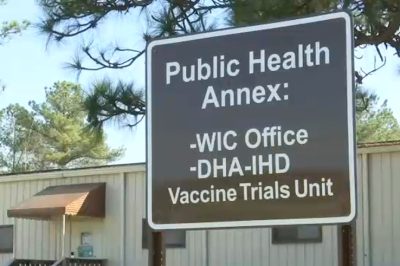Public health in practice: Fort Liberty military families benefit from new WIC office on base
June 5, 2023
Military families living at Fort Liberty (formerly Fort Bragg) are now enjoying healthier food thanks to the work of the Fort Liberty Public Health Partnership.

A sign marks the new WIC Office at Fort Liberty.
In March, the Cumberland County and Fort Liberty Departments of Public Health opened a Women, Infant and Children (WIC) office on post to improve affordable food access for military families.
Nationwide, nearly one in five soldiers and their families are food insecure, which means they can’t reliably get enough nutritious food for every person in the house to live an active, healthy life.
As Fort Liberty — located near Fayetteville, North Carolina — is the largest United States Army base by population, it follows that it is home to thousands of families who don’t always have enough to eat.
“Lieutenant Colonel Pearce — the Fort Liberty director of public health — and our team were really struck by the high rates of food insecurity on post,” said Hannah Prentice-Dunn, MPH, project director for cancer prevention and control at the University of North Carolina at Chapel Hill’s Lineberger Comprehensive Cancer Center. “Many families were already using WIC services, which echoed findings from recent national surveys about the experiences of military households.”

Hannah Prentice-Dunn
Prentice-Dunn leads the coordination of the Fort Liberty Public Health Partnership, which is a collaboration between the Fort Liberty Department of Public Health (DPH), Cumberland County DPH, UNC-Greensboro, UNC Gillings School of Global Public Health and UNC Lineberger. The group also has worked to reduce tobacco use on base and in the surrounding community.
To make the case for the new WIC office, Prentice-Dunn and her colleagues relied on results from a community survey that the UNC team conducted in partnership with Fort Liberty in the summer of 2021. There was a high response rate from soldiers and their families, and the data led to multiple new initiatives aimed at combatting food insecurity.
Three former students of the UNC Gillings School of Global Public Health’s Department of Health Behavior have supported the project across the past three years. Emma Stockton (a 2021 graduate) spearheaded the creation and dissemination of the community survey. Katie Aquilina (‘22) analyzed and summarized the survey data. Hannah Darr (‘23) conducted interviews with 10 programs and services around base that educate community members on the issue of food insecurity, which led to more integrated promotion of WIC benefits across various social services.
These ongoing contributions were encouraged by Jo Anne Earp Distinguished Professor Kurt Ribisl, PhD, who chairs the health behavior department and is a program leader at UNC Lineberger.

Krysta Gougler-Reeves
“This Partnership sits in a unique space — we collaborate across military, local public health and academic institutions — and we work collectively toward shared goals driven by community need,” said Krysta Gougler-Reeves, MPH, MSW, a project manager at UNC Lineberger who works alongside Prentice-Dunn to manage the Fort Liberty Public Health Partnership. “We plan to remove barriers to access, enrollment and continuity of services to amplify WIC outreach and reduce food insecurity. With the new office, families no longer have to travel off the military installation to access WIC benefits such as nutrition education, supplemental foods, breastfeeding support and referrals to community resources.”
Following the new WIC office ribbon cutting ceremony on March 7, ABC 11 posted a story and video about the new community resource. Military spouse Allison Nevins told the news outlet that having a WIC office just minutes away from her home is a big help, making it easier to stock up on milk and fruit for her family.
In May, the Partnership received a Public Health Innovation Award from the National Network of Public Health Institutes for working to reduce food insecurity among military families — and they have even bigger plans for the years to come.
The UNC, Cumberland County and Fort Liberty teams received a joint grant for $204,000 from the national Food Research & Action Center to expand their focus on WIC outreach in the Fort Liberty community. With this funding, they will hire a full-time WIC outreach coordinator, develop a social marketing campaign to combat stigma around accessing WIC benefits, and explore new virtual and electronic systems that may reduce barriers to using WIC programs.
The Partnership also plans to go national by creating a Military WIC Office Council that will bring together representatives from WIC offices located on bases around the U.S. to share best practices and outreach strategies.
Contact the UNC Gillings School of Global Public Health communications team at sphcomm@unc.edu.
